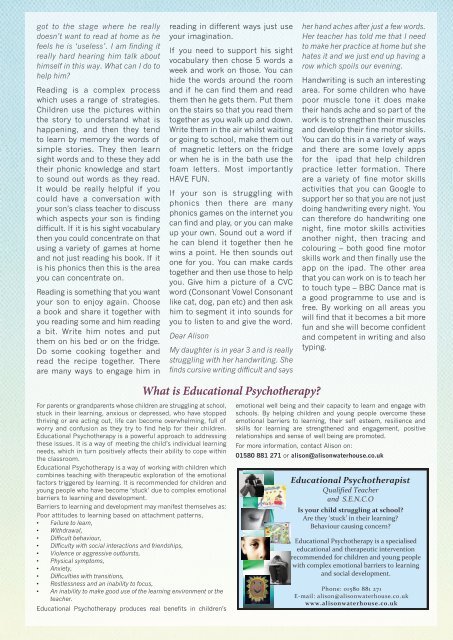January/February 2018
Golden Times Jan/Feb 2018
Golden Times Jan/Feb 2018
Create successful ePaper yourself
Turn your PDF publications into a flip-book with our unique Google optimized e-Paper software.
got to the stage where he really<br />
doesn’t want to read at home as he<br />
feels he is ‘useless’. I am finding it<br />
really hard hearing him talk about<br />
himself in this way. What can I do to<br />
help him?<br />
Reading is a complex process<br />
which uses a range of strategies.<br />
Children use the pictures within<br />
the story to understand what is<br />
happening, and then they tend<br />
to learn by memory the words of<br />
simple stories. They then learn<br />
sight words and to these they add<br />
their phonic knowledge and start<br />
to sound out words as they read.<br />
It would be really helpful if you<br />
could have a conversation with<br />
your son’s class teacher to discuss<br />
which aspects your son is finding<br />
difficult. If it is his sight vocabulary<br />
then you could concentrate on that<br />
using a variety of games at home<br />
and not just reading his book. If it<br />
is his phonics then this is the area<br />
you can concentrate on.<br />
Reading is something that you want<br />
your son to enjoy again. Choose<br />
a book and share it together with<br />
you reading some and him reading<br />
a bit. Write him notes and put<br />
them on his bed or on the fridge.<br />
Do some cooking together and<br />
read the recipe together. There<br />
are many ways to engage him in<br />
reading in different ways just use<br />
your imagination.<br />
If you need to support his sight<br />
vocabulary then chose 5 words a<br />
week and work on those. You can<br />
hide the words around the room<br />
and if he can find them and read<br />
them then he gets them. Put them<br />
on the stairs so that you read them<br />
together as you walk up and down.<br />
Write them in the air whilst waiting<br />
or going to school, make them out<br />
of magnetic letters on the fridge<br />
or when he is in the bath use the<br />
foam letters. Most importantly<br />
HAVE FUN.<br />
If your son is struggling with<br />
phonics then there are many<br />
phonics games on the internet you<br />
can find and play, or you can make<br />
up your own. Sound out a word if<br />
he can blend it together then he<br />
wins a point. He then sounds out<br />
one for you. You can make cards<br />
together and then use those to help<br />
you. Give him a picture of a CVC<br />
word (Consonant Vowel Consonant<br />
like cat, dog, pan etc) and then ask<br />
him to segment it into sounds for<br />
you to listen to and give the word.<br />
Dear Alison<br />
My daughter is in year 3 and is really<br />
struggling with her handwriting. She<br />
finds cursive writing difficult and says<br />
her hand aches after just a few words.<br />
Her teacher has told me that I need<br />
to make her practice at home but she<br />
hates it and we just end up having a<br />
row which spoils our evening.<br />
Handwriting is such an interesting<br />
area. For some children who have<br />
poor muscle tone it does make<br />
their hands ache and so part of the<br />
work is to strengthen their muscles<br />
and develop their fine motor skills.<br />
You can do this in a variety of ways<br />
and there are some lovely apps<br />
for the ipad that help children<br />
practice letter formation. There<br />
are a variety of fine motor skills<br />
activities that you can Google to<br />
support her so that you are not just<br />
doing handwriting every night. You<br />
can therefore do handwriting one<br />
night, fine motor skills activities<br />
another night, then tracing and<br />
colouring – both good fine motor<br />
skills work and then finally use the<br />
app on the ipad. The other area<br />
that you can work on is to teach her<br />
to touch type – BBC Dance mat is<br />
a good programme to use and is<br />
free. By working on all areas you<br />
will find that it becomes a bit more<br />
fun and she will become confident<br />
and competent in writing and also<br />
typing.<br />
For parents or grandparents whose children are struggling at school,<br />
stuck in their learning, anxious or depressed, who have stopped<br />
thriving or are acting out, life can become overwhelming, full of<br />
worry and confusion as they try to find help for their children.<br />
Educational Psychotherapy is a powerful approach to addressing<br />
these issues. It is a way of meeting the child’s individual learning<br />
needs, which in turn positively affects their ability to cope within<br />
the classroom.<br />
Educational Psychotherapy is a way of working with children which<br />
combines teaching with therapeutic exploration of the emotional<br />
factors triggered by learning. It is recommended for children and<br />
young people who have become ‘stuck’ due to complex emotional<br />
barriers to learning and development.<br />
Barriers to learning and development may manifest themselves as:<br />
Poor attitudes to learning based on attachment patterns,<br />
• Failure to learn,<br />
• Withdrawal,<br />
• Difficult behaviour,<br />
• Difficulty with social interactions and friendships,<br />
• Violence or aggressive outbursts,<br />
• Physical symptoms,<br />
• Anxiety,<br />
• Difficulties with transitions,<br />
• Restlessness and an inability to focus,<br />
• An inability to make good use of the learning environment or the<br />
teacher.<br />
Educational Psychotherapy produces real benefits in children’s<br />
What is Educational Psychotherapy?<br />
emotional well being and their capacity to learn and engage with<br />
schools. By helping children and young people overcome these<br />
emotional barriers to learning, their self esteem, resilience and<br />
skills for learning are strengthened and engagement, positive<br />
relationships and sense of well being are promoted.<br />
For more information, contact Alison on:<br />
01580 881 271 or alison@alisonwaterhouse.co.uk<br />
Educational Psychotherapist<br />
Qualified Teacher<br />
and S.E.N.C.O<br />
Is your child struggling at school?<br />
Are they ‘stuck’ in their learning?<br />
Behaviour causing concern?<br />
Educational Psychotherapy is a specialised<br />
educational and therapeutic intervention<br />
recommended for children and young people<br />
with complex emotional barriers to learning<br />
and social development.<br />
Phone: 01580 881 271<br />
E-mail: alison@alisonwaterhouse.co.uk<br />
www.alisonwaterhouse.co.uk<br />
To advertise in Golden Times call Debby on 01424 429139 or email debby@goldentimes.co.uk 21
















